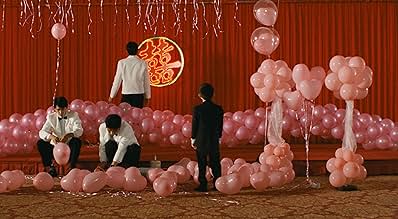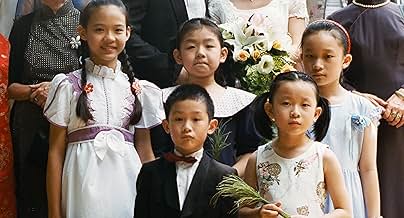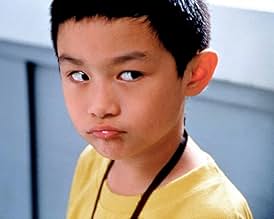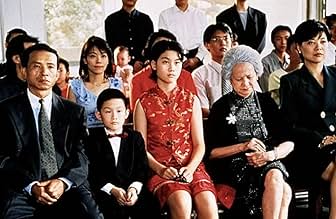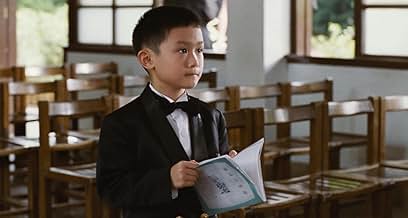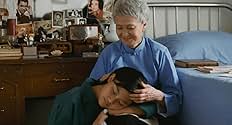Retrato de uma família de classe média em Taipé. Um homem na casa dos quarenta, a sua filha adolescente e o seu filho de oito anos navegam entre o remorso, a esperança e a desilusão.Retrato de uma família de classe média em Taipé. Um homem na casa dos quarenta, a sua filha adolescente e o seu filho de oito anos navegam entre o remorso, a esperança e a desilusão.Retrato de uma família de classe média em Taipé. Um homem na casa dos quarenta, a sua filha adolescente e o seu filho de oito anos navegam entre o remorso, a esperança e a desilusão.
- Direção
- Roteirista
- Artistas
- Prêmios
- 14 vitórias e 23 indicações no total
- N.J.
- (as Nianzhen Wu)
- A-Di
- (as Xisheng Chen)
- Sherry Chang-Breitner
- (as Suyun Ke)
- Dada
- (as Michael Tao)
- Xiao-Yan
- (as Shushen Xiao)
- Lili
- (as Adrian Lin)
- Pangzi
- (as Yupang Chang)
- Grandma
- (as Ruyun Tang)
- Mrs. Jiang
- (as Shuyuan Xu)
- Yunyun
- (as Xinyi Zeng)
- Migo
- (as Yungfeng Li)
- Nancy
- (as Shihui Jin)
- Shu Ge
- (as Guozhi Shu)
Avaliações em destaque
Yang masterfully uses the everyday things of life on a least two levels - the literal and the figurative - beginning with the title of the film, which means literally "one one" (in Chinese) or "individual", but is presented as a Chinese "one" on the screen, followed slowly by another Chinese "one" appearing on the screen below it, which then becomes "two". (In Chinese, one is a single line, and two is two singles lines, one above the other.)
We are individuals, together. Our lives involve us, and others. Our lives involve relationships, get their meanings from relationships.
Relationships like that of little boy Yang Yang's encounters with girls, violent at first as they poke him from behind (in the back of his head, where he cannot see), and he pops balloons in their faces, scaring them. And then as the electricity builds between them, between Yang Yang and the girl in his school, just as in the nature film in the science lesson presented in the audio-visual classroom, passion as an electrical spark comes to his life.
There is Yang Yang's sister Ting Ting in the school of life too, with her ever-present potted plant that cannot seem to bloom. In class, she is told that overfeeding can cause it not to bloom - and Ting Ting herself tries too hard to bloom, longing for "music in her life" as she listens to the concert duet played by a man and a woman while she glances at her date, the boy called "Fatty" - he is slim but does he dine too much at life's banquet? (That question is answered later, as violent storms - storms of love, of life - pass overhead, not expected again "until Thursday".) Ting Ting wears white, and could be at her wedding, but she is not.
Their dad, NJ, does manage to find the music of his life once again when he encounters Sherry, the flame of his youth. They take a train back into time they remember as simple and romantic, but the memories of the past veil the complexities that existed then, and now, for the two of them.
NJ's wife Ming Ming wishes to escape. Her work colleague Nancy asks her, "You're still here?" to which she replies "Where can I go?"
Indeed, where can we go? No, we must stay and wake up each day, and try to remember that each day is a first time, that we never live the same day twice, as enchanting Mr. Ota, NJ's potential business partner, reminds him, and us.
It seems there is magic at work all around. But it is not magic at all, as we learn from Mr. Ota's card trick -- merely attention. Maybe it's the reflection's ability to split out attention out into many streams of thought and quickly focus it back down that gives his scenes their vertiginous exhilaration. How else to explain the rush one feels from looking at a completely static shot where you can barely make out the actors?
He set out to make a film about family but I think he discovered he also wanted to make a film about life in Taipei. The reflections are the device that lets him make two movies at once. I think that's what is most special about each reflective shot. It is the instantaneous visual realization of an epic goal, and a reminder to the audience of both themes working in the movie.
His assuredness and gentleness astounds me.
Você sabia?
- CuriosidadesAlthough As Coisas Simples da Vida (2000) is often regarded as one of the greatest Taiwanese films ever made, it was not officially released to the public in Taiwan until 2017.
- Citações
Yang-Yang: I'm sorry, Grandma. It wasn't that I didn't want to talk to you. I think all the stuff I could tell you... You must already know. Otherwise, you wouldn't always tell me to 'Listen!' They all say you've gone away. But you didn't tell me where you went. I guess it's someplace you think I should know. But, Grandma, I know so little. Do you know what I want to do when I grow up? I want to tell people things they don't know. Show them stuff they haven't seen. It'll be so much fun. Perhaps one day... I'll find out where you've gone. If I do, can I tell everyone, and bring them to visit you? Grandma, I miss you. Especially when I see my newborn cousin who still doesn't have a name. He reminds me that you always said you felt old. I want to tell him that I feel I am old, too.
- Trilhas sonorasSweetly Breathing
Adaptation by Kaili Peng
Composed by Ludwig van Beethoven
Arranged by Tu Yin
Performed by Kaili Peng
Principais escolhas
- How long is Yi Yi?Fornecido pela Alexa
Detalhes
Bilheteria
- Faturamento bruto nos EUA e Canadá
- US$ 1.136.776
- Faturamento bruto mundial
- US$ 1.408.333
- Tempo de duração
- 2 h 53 min(173 min)
- Cor
- Mixagem de som
- Proporção
- 1.85 : 1

![Assistir a Trailer [OV]](https://m.media-amazon.com/images/M/MV5BZTRjM2EzYzYtYmM4ZS00ZTgyLTlhOTctMWExY2VmMmJiNDdjXkEyXkFqcGdeQXRyYW5zY29kZS13b3JrZmxvdw@@._V1_QL75_UX500_CR0)



